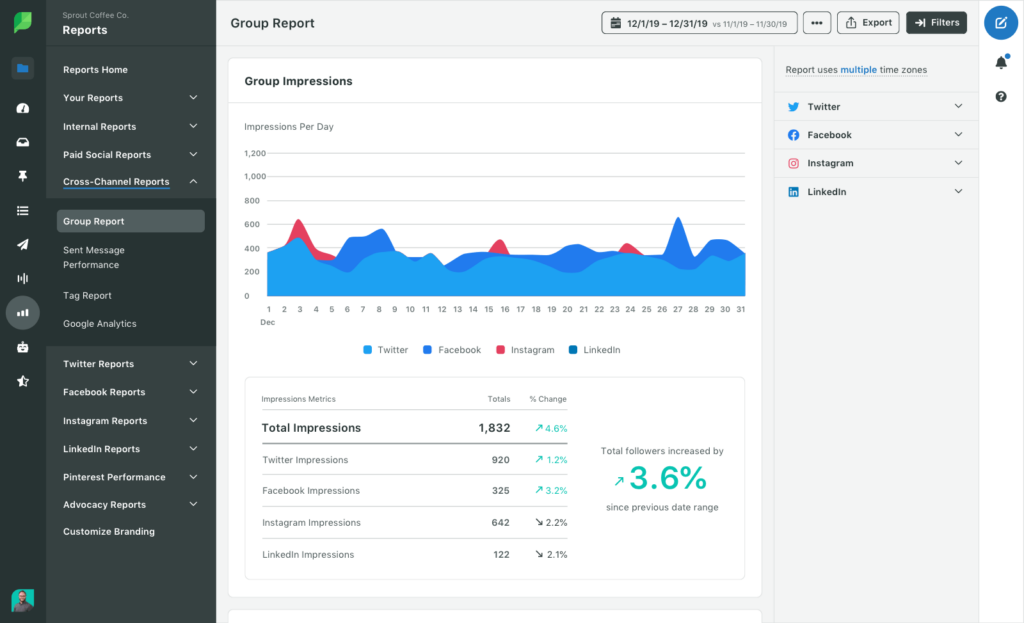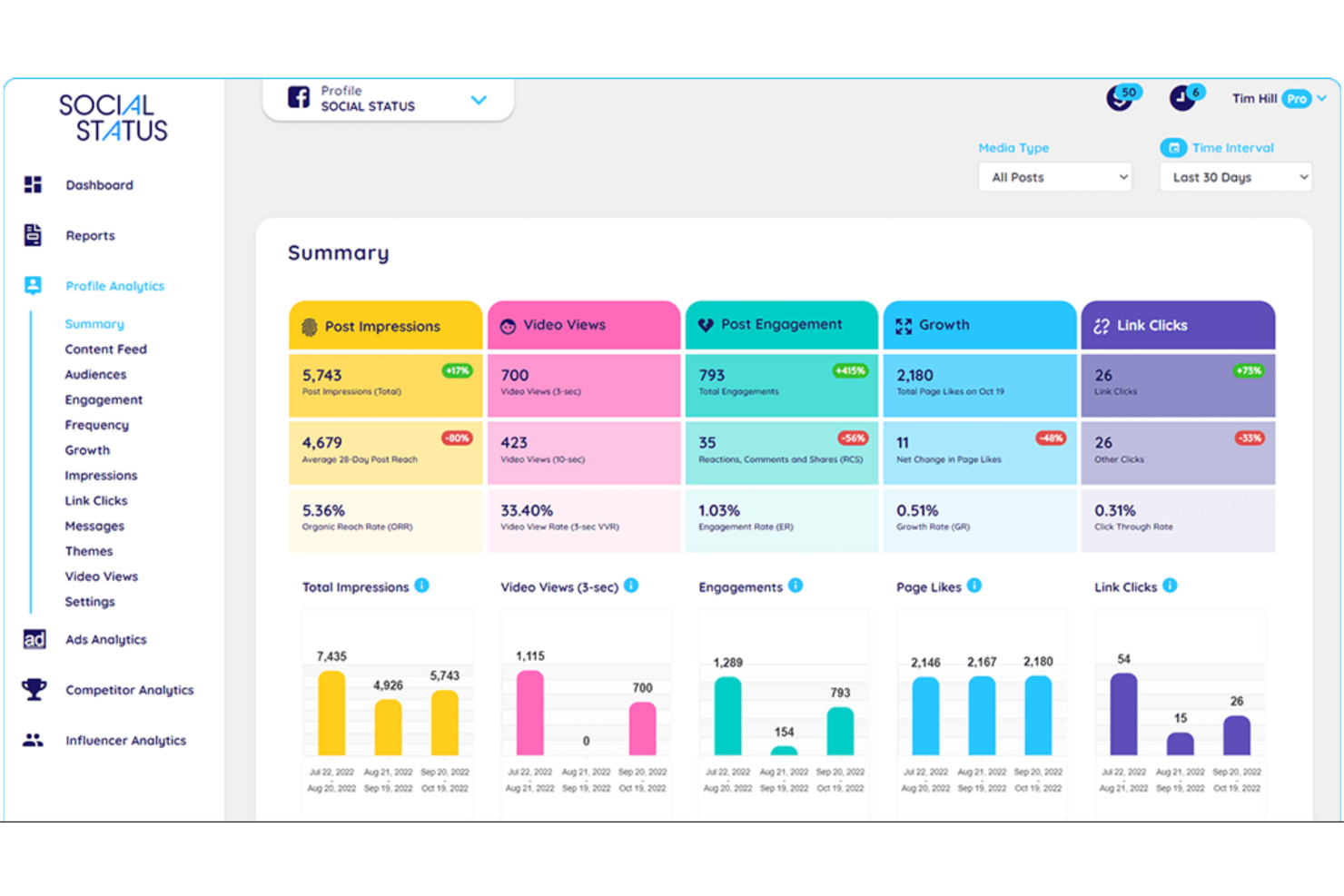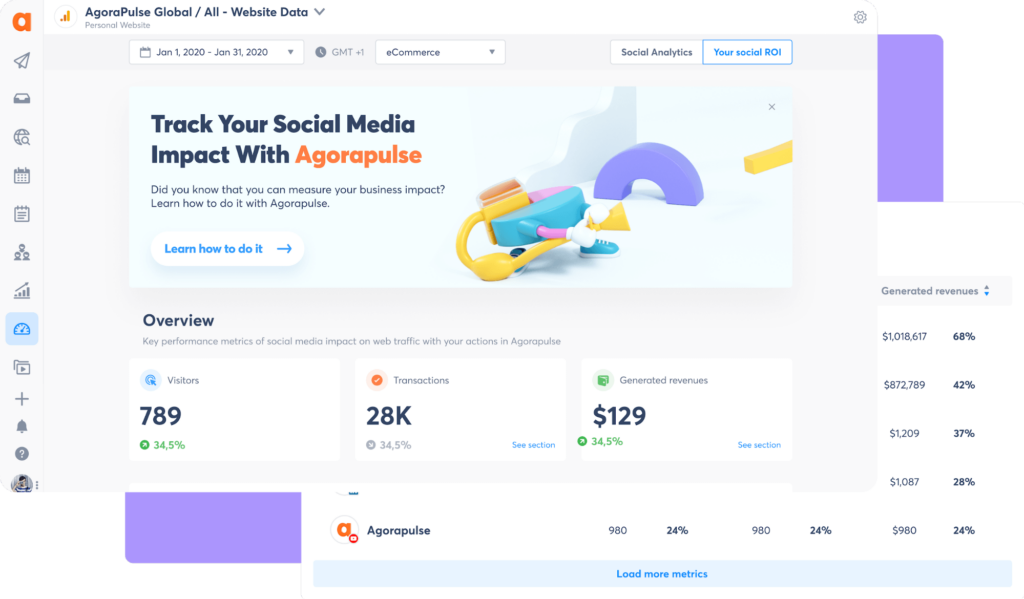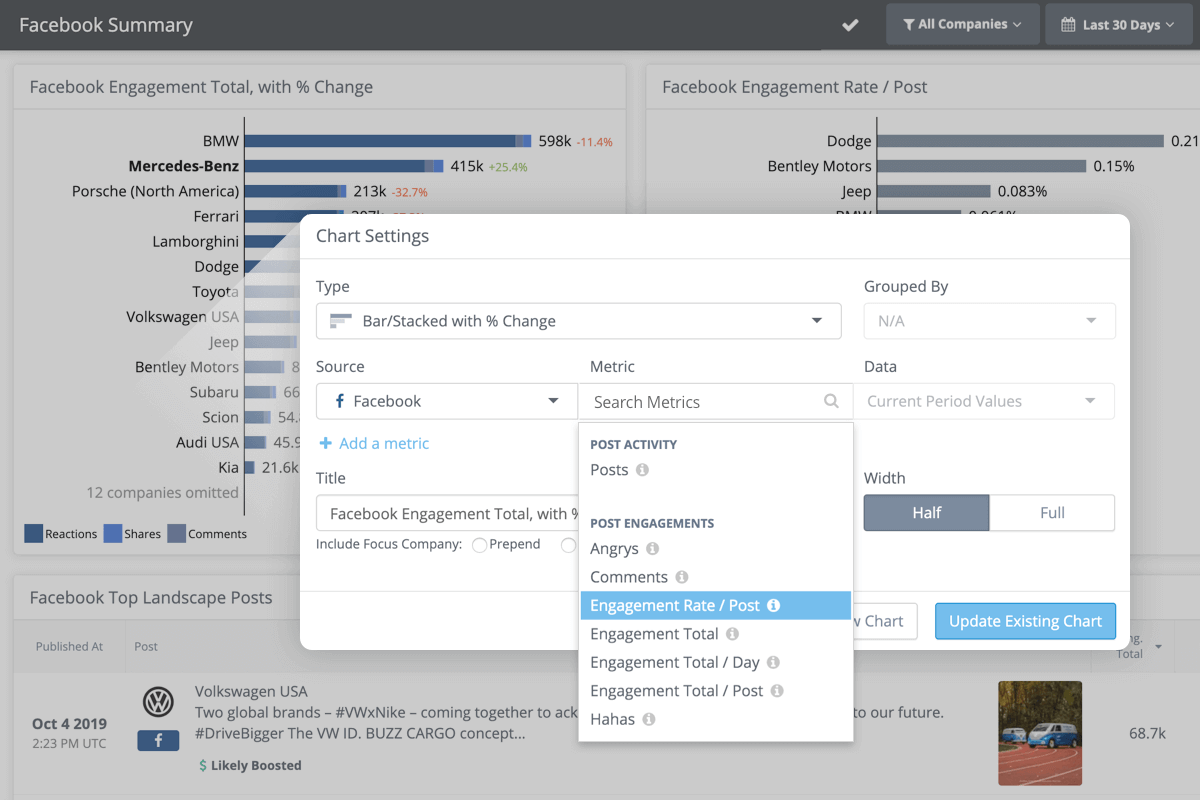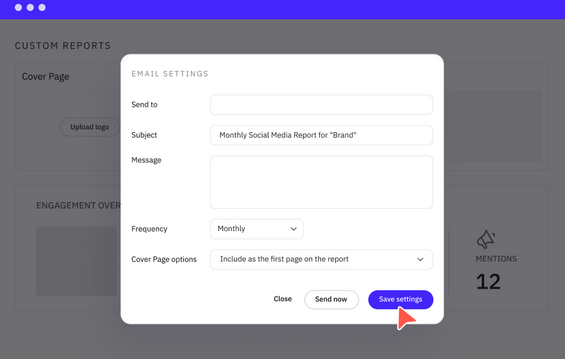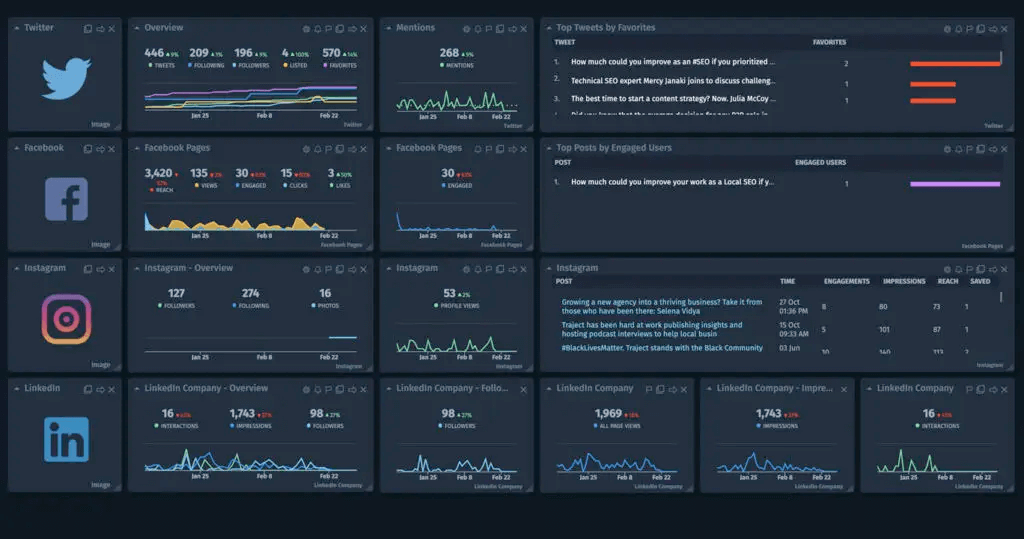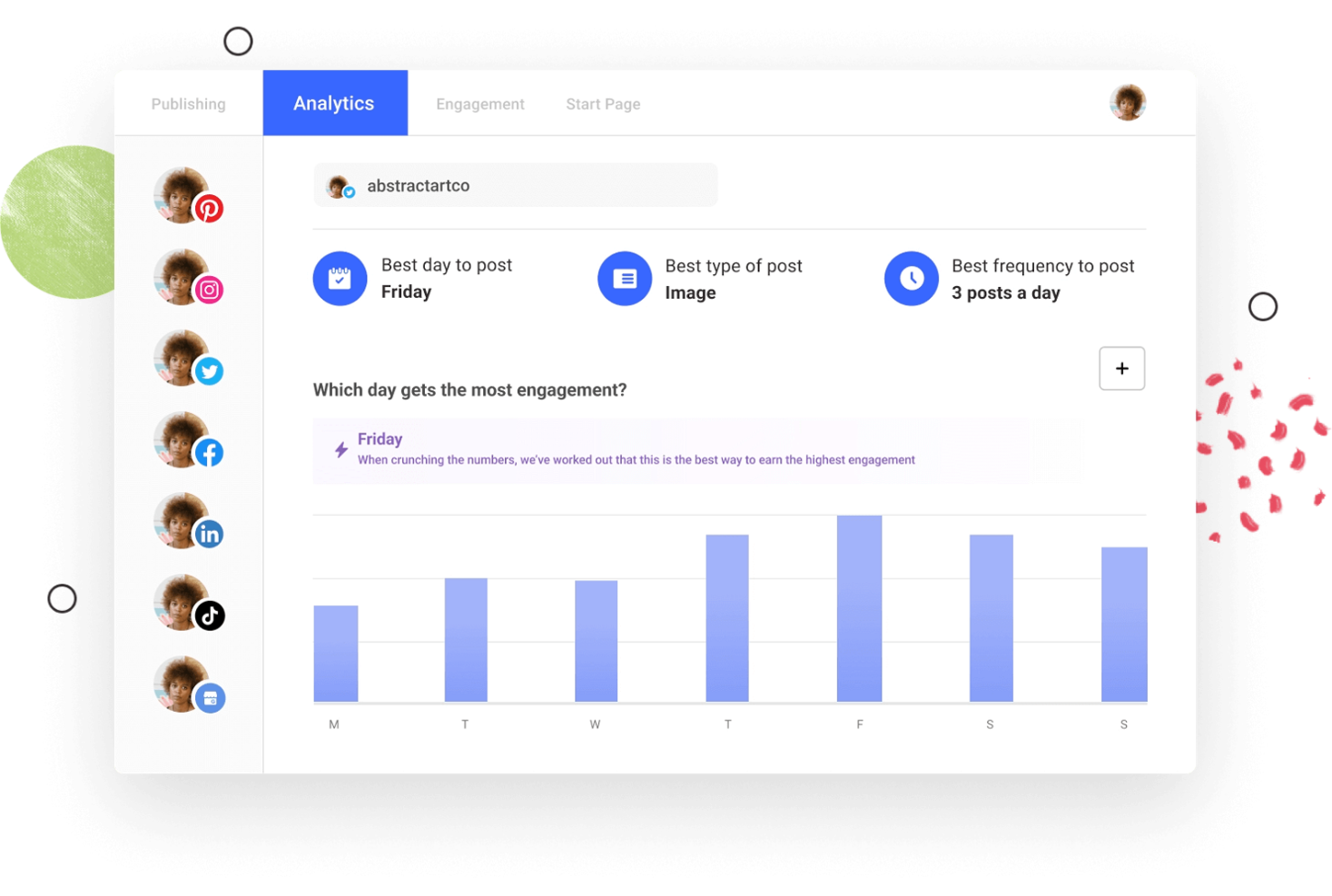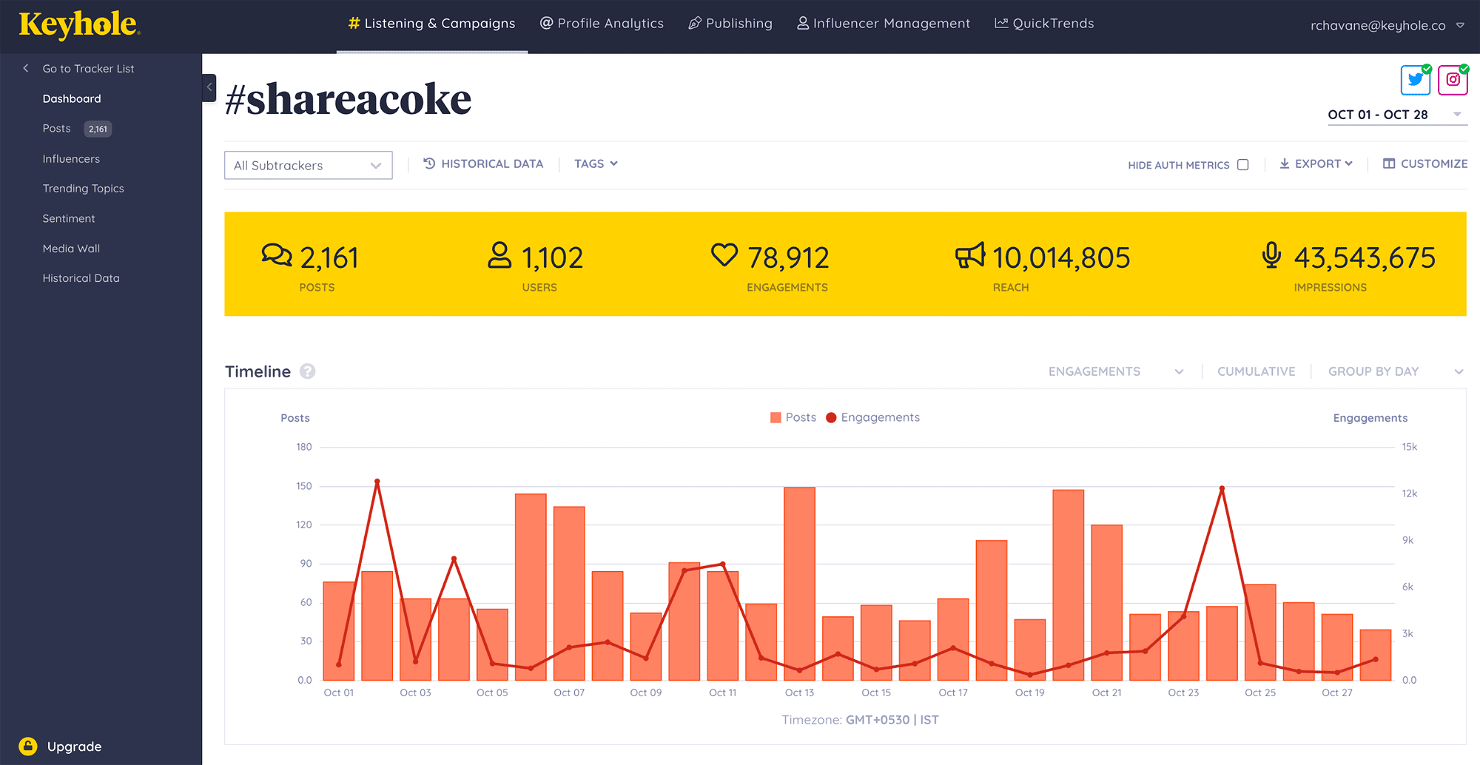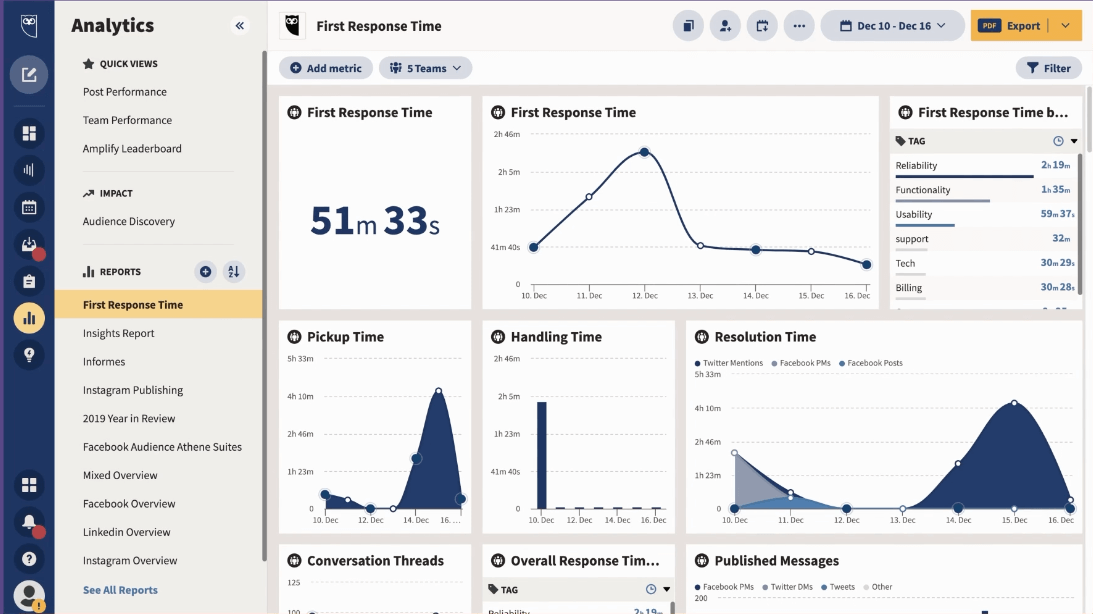10 Best Social Media Analytics Software Shortlist
Here’s my shortlist of the very best social media analytics software, along with what I found each does best:
Is your social media strategy built on gut feelings instead of hard data? Considering how fast things change these days, that's a recipe for disaster.
And look, I get it. It can be much easier to guesstimate than go through the hassle of cobbling together reports from a dozen different social channels, and then trying to make sense of it all.
Hands up if you're like me, rooting for the Fediverse.
Back to the issue of social media analytics tools. This is where my experience as a social media strategist who's spent time putting most of the market's top tools through their paces comes in handy.
Combining my experience with our software review system, I'll be sharing our top 21 picks for the best social media analytics software.
Why Trust Our Reviews
We’ve been testing and reviewing marketing software since 2022. As marketing experts ourselves, we know how critical and difficult it is to make the right decision when selecting software.
We invest in deep research to help our audience make better software purchasing decisions. We’ve tested more than 2,000 tools for different marketing use cases and written over 1,000 comprehensive software reviews. Learn how we stay transparent & our software review methodology.
The Best Social Media Analytics Software Summary
| Tools | Price | |
|---|---|---|
| Sprout Social | From $199/user/month (billed annually) | Website |
| Social Status | From $6.75/month (billed annually) | Website |
| Brand24 | From $79/month (annually) | Website |
| Agorapulse | From $79/user/month | Website |
| Rival IQ | From $239 per month, additional users cost $10 per month. | Website |
| Sendible | From $29/user/month | Website |
| Cyfe | From $19/month | Website |
| Buffer | From $6/user/month | Website |
| Keyhole | From $79/user/month | Website |
| Hootsuite | From $49/user/month (min 3 seats, billed annually), Hootsuite's pricing reflects its position as a professional-grade tool for social media management. | Website |

Compare Software Specs Side by Side
Use our comparison chart to review and evaluate software specs side-by-side.
Compare SoftwareHow to Choose Social Media Analytics Software
With so many different social media analytics software available, it can be challenging to make decisions on what social media analytics software is going to be the best fit for your needs.
As you're shortlisting, trialing, and selecting social media analytics software, consider the following:
- What problem are you trying to solve - Start by identifying the social media analytics feature gap you're trying to fill to clarify the features and functionality the social media analytics software needs to provide.
- Who will need to use it - To evaluate cost and requirements, consider who'll be using the software and how many licenses you'll need. You'll need to evaluate if it'll just be the marketing team, or the whole organization that will require access. When that's clear, it's worth considering if you're prioritizing ease of use for all, or speed for your marketing software power users.
- What other tools it needs to work with - Clarify what tools you're replacing, what tools are staying, and the tools you'll need to integrate with, such as accounting, CRM or HR software. You'll need to decide if the tools will need to integrate together, or alternatively, if you can replace multiple tools with one consolidated social media analytics software.
- What outcomes are important - Consider the result that the software needs to deliver to be considered a success. Consider what capability you want to gain, or what you want to improve, and how you will be measuring success. For example, an outcome could be the ability to get greater visibility into performance. You could compare social media analytics software features until you’re blue in the face but if you aren’t thinking about the outcomes you want to drive, you could be wasting a lot of valuable time.
- How it would work within your organization - Consider the software selection alongside your workflows and delivery methodology. Evaluate what's working well, and the areas that are causing issues that need to be addressed. Remember every business is different — don’t assume that because a tool is popular that it'll work in your organization.
Best Social Media Analytics Software Reviews
Here’s a brief description of each social media analytics software that showcases each tool’s best use case, its noteworthy features, and some pros and cons. I’ve also included screenshots to give you a snapshot of their user interface.
Sprout Social is an all-in-one social media platform that features advanced analytics and social listening. It makes it easy to learn everything you need to know about your audience to improve your campaigns.
Why I picked Sprout Social: Sprout Social may be an all-in-one platform, but that doesn’t mean its analytics features are subpar. In fact, it features some of the most in-depth reporting and listening tools on the market.
Best of all, it does much of the heavy lifting for you. AI and machine learning technology sift through millions of data points to automatically generate audience insights like trending topics and hashtags. Reports even show how your audience feels about your competitors, and how to differentiate your business.
Sprout Social Standout Features and Integrations
Features include audience analysis, consumer research, influencer recognition, sentiment analysis, trend identification, and performance reports for specific channels and posts.
Integrations include every major social media network, WhatsApp, Google Business Messages, Canva, Bitly, Dropbox, Google Analytics, Hubspot and more.
Pros and cons
Pros:
- Great social listening capabilities
- User-friendly interface
- Incredibly robsifteports
Cons:
- Support can be slow to respond
- Pricing may be prohibitive
Social Status is a social media analytics and reporting tool designed for agencies and brands to automate their social media reporting processes.
Why I picked Social Status: Social Status is a social media analytics software that automates social reporting, tracks and analyzes social profiles, ad accounts, competitor profiles, and influencer marketing campaigns. It provides Competitor Analytics, Profile Analytics, Influencer Analytics, and Ads Analytics, allowing users to track and analyze their social profiles, ad accounts, influencer marketing campaigns, and spy on public competitor profiles.
Social Status additionally offers customizable templates, competitor benchmarking, and insights for platforms like Facebook, Instagram, TikTok, and LinkedIn. Overall, the platform aims to provide actionable insights and help users prove the ROI of their social media activities.
Social Status Standout Features and Integrations
Features include customizable dashboards, exportable data, sentiment analysis, historical data access, scheduled reports, content scheduling insights, hashtag tracking, and audience demographics.
Integrations include support for various social media channels including Facebook Pages, Instagram Professional Profiles, Instagram Stories & Reels, Meta Business Suite, Meta Ads Manager, TikTok Profiles, LinkedIn Company Pages, Twitter (X) Profiles, YouTube Channels, and YouTube Shorts.
Pros and cons
Pros:
- Offers performance tracking for multiple profiles
- Provides detailed audience demographic insights
- Supports multi-user collaboration
Cons:
- Report customization only available on higher tier plans
- No functionality for social media management or scheduling
Brand24 is a social media analytics software that offers comprehensive monitoring and analysis of brand mentions across social platforms, enabling businesses to gain insights into their online presence and audience engagement.
Why I picked Brand24: Brand24 shines as a social media analytics software by providing an extensive suite of tools designed to track and analyze online conversations about a brand across multiple social media platforms.
Brand24 aggregates data on brand mentions, hashtags, and keywords in real time, offering businesses a holistic view of their social media presence and audience sentiment. This enables companies to measure the impact of their social media campaigns, identify trends in customer feedback, and engage with their audience more effectively.
Brand24's analytics include detailed reports on the volume of mentions, sentiment analysis, and the reach of social media conversations, helping businesses to understand their audience better, refine their social media strategies, and improve their overall online reputation.
Brand24 Standout Features and Integrations
Features include social listening, social media monitoring, a mentions feed, discussion volumes chart, marketing analytics, influencer scoring, sentiment analysis, customizable notifications & alerts, data exporting, and data filtering.
Integrations include Slack and SEMrush.
Pros and cons
Pros:
- Analytics covers blogs and forums as well as social platforms
- Social listening works across almost every platform.
- Exceptionally user-friendly
Cons:
- Support isn't instantaneous
- Sentiment analysis could be more accurate
Agorapulse is an all-in-one social media tool that integrates with Google Analytics so you can calculate the true impact of your campaigns.
Why I picked Agorapulse: By helping users to prove the ROI of their social media campaigns, Agorapulse offers a truly all-in-one social media analytics platform. The platform offers all of the analysis features you expect, such as in-depth reports, social listening, and trend insights.
Take things further by connecting Agorapulse to Google Analytics and other platforms to calculate revenue generated by each of your campaigns in an intuitive dashboard that leverages historical data to show how your ROI changes over time.
Agorapulse Standout Features and Integrations
Features include automated ROI reporting, social media response time analysis, trend insights, custom reports, CSV exports, and a mobile app.
Integrations include Facebook, Twitter, Instagram, YouTube, TikTok, and LinkedIn.
Pros and cons
Pros:
- User-friendly layout
- In-depth reports
- Unrivaled ROI reporting
Cons:
- Doesn’t support every platform (like Pinterest)
- Difficulty scheduling and planning content with the platform
Rival IQ provides in-depth analysis of every major social channel, with a particular focus on competitive benchmarking. Automated competitor analysis significantly cuts research time.
Why I picked Rival IQ: Rival IQ is the tool for any brand that wants to leverage its rivals’ audiences and benchmark its success. On top of the standard social media reporting features you’d expect, the platform offers extensive competitor analysis so you can track exactly what your competitors are doing.
This includes automated monitoring of your rivals’ presence that helps you identify new opportunities and topics to increase engagement.
Rival IQ Standout Features and Integrations
Features include automated benchmarking and analysis, boosted post detection, position comparison, proactive alerts, in-depth post analysis, and comprehensive social media audits.
Integrations include Facebook, Instagram, Twitter, YouTube, LinkedIn, and TikTok. You can also use the Rival IQ API to integrate the platform’s data into other tools.
Pros and cons
Pros:
- Real-time insights
- Customizable reporting formats, including slideshows
- Unrivaled competitor analysis
Cons:
- Lacks social listening
- Lack of historical data
Sendible is a social media analytics platform that lets you manage and monitor your online presence at scale, making it the perfect choice for enterprise brands and agencies.
Why I picked Sendible: Sendible is packed with features directly targeted at agency owners. That includes dedicated client dashboards, automated reporting and enhanced security features like non-password-based connections.
When you’re managing dozens of clients, you don’t want to waste time creating reports. Sendible makes it easy to build in-depth reports in an instant, customizing them with the metrics that matter most to each client.
It also provides the insights agencies need to grow their clients’ followings, like best time to post and most engaged followers.
Sendible Standout Features and Integrations
Features include white label plans, individual dashboards, automated reporting, customized reports, hashtag and keyword monitoring, and engagement reports.
Integrations include every major social media network, YouTube, Google Business Profiles, WordPress, Canva, Dropbox, Google Drive, and GIPHY.
Pros and cons
Pros:
- Easy to find influencers
- Individual dashboard for each client
- Reporting hub
Cons:
- Can’t manage Pinterest
- Real-time monitoring could be better
Cyfe is a social media-focused dashboard platform that offers users exceptional visualization capabilities and a single solution when it comes to monitoring and reporting social media performance.
Why I picked Cyfe: Cyfe is the go-to platform for businesses that want to aggregate all of their data (social media and otherwise) in a single dashboard. Collecting and visualizing that much data in one space may sound complicated, but Cyfe is incredibly easy to use.
There are multiple pre-built dashboard templates that you can use to get started, and it only takes a couple of minutes to start pulling in data from your accounts. For those that want to customize the experience, Cyfe lets you customize colors and logos, create branded reports, and launch custom URLs that clients or stakeholders can access without logging in.
Cyfe Standout Features and Integrations
Features include pre-built widgets and starter dashboards, automated reporting and alerts, historical data, custom URLs, and embedded analytics.
Integrations include all major social media platforms, Google Analytics, Salesforce, Mailchimp, Moz, HubSpot, YouTube, Shopify and dozens more.
Pros and cons
Pros:
- Completely customizable
- Easy to get started
- Integrates with over 250 data sources
Cons:
- No mobile app
- Can’t manage social media channels
Buffer is an all-in-one social media platform with tools to help you build, manage and track your social presence. Simplicity and value are key differentiators for Buffer. And while other tools may overwhelm you with analysis, Buffer helps you get a broad understanding of your social media performance in a single dashboard.
Why I picked Buffer: If you’re just getting started with social media analysis, Buffer gives you all of the insights you need in an intuitive and easy-to-use tool. Track your performance across Instagram, Facebook, Twitter, and LinkedIn. Compare paid and organic campaigns, create white label reports, and find answers to your most burning questions.
Buffer also boasts an insight-backed blog and content library that offers guidance on how to use their tool and become a better marketer.
Buffer Standout Features and Integrations
Features include easy-to-use dashboards, audience demographics, stories and post analytics, white label reports, daily updates, and alerts.
Integrations include every major social media platform, Canva, Zapier, IFTTT, Make, WordPress, Microsoft, Pixlee, SocialBee and more.
Pros and cons
Pros:
- Lets you schedule posts as well as analyze them
- East to connect social accounts
- Great UI
Cons:
- Limited integration with some social networks
- Lacks more advanced analytic options
Why I picked Keyhole: Things change fast in social media, which is why you need a tool that delivers real-time tracking and insights. Keyhole does that and more. You can also monitor what your audiences are saying in real-time through social listening, spy on your competitors, discover top influencers, and create PDF reports.
Keyhole Standout Features and Integrations
Features include hashtags and keywords trackers, influencer tracking, competitor tracking, automated reporting, live stream, sentiment analysis, and demographic analysis.
Integrations include Facebook, Instagram, TikTok, YouTube, and Twitter. You can also create your own integrations using Keyhole’s Social Media Analytics and Media Monitoring API.
Pros and cons
Pros:
- Excellent social listening
- Easy to use
- Comprehensive range of real-time metrics
Cons:
- Scheduling functionality could be better
- Data limits on tracking
A comprehensive all-in-one platform, Hootsuite provides no shortage of insights for companies looking to track performance and grow their presence.
Why I picked Hootsuite: The platform has all of the tools large companies need to manage, monitor and grow their social media presence in one place. As well as some of the best publishing functionality on the market, Hootsuite also has seriously in-depth reporting.
Real-time analysis helps you identify top-performing posts and stay ahead of the competition. Social listening features with sentiment analysis help you understand what your audience really thinks. And customizable, in-depth reports let you showcase your results to stakeholders.
Hootsuite Standout Features and Integrations
Features include real-time analysis, customizable reports, competitor analysis, automated alerts, social listening, and customizable dashboards.
Integrations include every major social media network, Google My Business, MailChimp, HubSpot, Canva, Brandwatch, and dozens more.
Pros and cons
Pros:
- All-in-one platform
- Competitive intel
- In-depth analytics of every platform
Cons:
- Can be expensive
- May be overwhelming for smaller businesses or beginner marketers
Other Social Media Analytics Software
Here are a few more worthwhile options that didn’t make the best social media analytics software list:
Related Marketing Tool Reviews
If you still haven't found what you're looking for here, check out these tools closely related to digital marketing strategy that we've tested and evaluated.
- Marketing Software
- Marketing Management Software
- Account Based Marketing Software
- Social Media Management Software
- Email Marketing Software
Selection Criteria for Social Media Analytics Software
Selecting the right social media analytics software involves a careful evaluation of what they have to offer. Through extensive personal trials and research, I've developed criteria to guide software buyers towards making an informed decision.
Core Social Media Analytics Software Functionality: 25% of total weighting score
The solution should support these common use cases:
- Tracking engagement metrics (likes, shares, comments)
- Analyzing audience demographics and behavior
- Monitoring brand mentions and sentiment analysis
- Competitor analysis and benchmarking
- Reporting and visualization of data
Additional Standout Features: 25% of total weighting score
These include:
- Advanced sentiment analysis leveraging AI and NLP for deeper insights
- Predictive analytics for forecasting trends and campaign outcomes
- Integration capabilities with CRM and marketing automation tools for streamlined workflows
- Real-time alerts for instant response to social mentions or crises
- Influencer tracking and analysis to identify and engage with brand advocates
Usability: 10% of total weighting score
In evaluating usability, I look for:
- An intuitive, clean interface design that simplifies navigation
- Customizable dashboards that allow users to highlight key metrics
- Drag-and-drop features for easy report creation
- Mobile app availability for on-the-go monitoring and analysis
Onboarding: 10% of total weighting score
Effective onboarding is key to realizing value quickly:
- Comprehensive training materials such as videos, webinars, and tutorials
- Interactive product tours and easy-to-use templates
- Responsive customer support during the setup process
- A community forum for peer advice and best practices
Customer Support: 10% of total weighting score
Strong customer support is essential:
- Multiple channels for support (email, chat, phone)
- A knowledge base with FAQs and troubleshooting guides
- Quick response times and proactive support options
- Dedicated account management for enterprise clients
Value For Money: 10% of total weighting score
Value assessment involves:
- Transparent pricing models with no hidden costs
- Flexible plans that scale with business growth
- Free trials or demos to evaluate the tool before purchase
- Features and capabilities that justify the investment
Customer Reviews: 10% of total weighting score
Customer feedback provides real-world insights:
- High overall satisfaction scores indicating a positive user experience
- Testimonials highlighting specific benefits and improvements
- Reviews that mention successful resolution of pain points
- Frequent mentions of ease of use, robust features, and excellent support
By meticulously evaluating these criteria, you can select a social media analytics tool that not only meets your immediate needs but also scales with your business, ensuring you derive maximum value from your social media efforts.
Trends in Social Media Analytics Software for 2024
Here are some trends I’ve noticed for social media analytics technology, plus what they might mean for the future of the marketing industry. I sourced countless product updates, press releases, and release logs to tease out the most important insights.
- Integration with Emerging Social Platforms: Analytics tools are expanding their reach beyond traditional platforms like Facebook and Instagram to include newer and niche platforms such as TikTok and Discord. This trend underscores the importance of keeping pace with where audiences are moving and the diversification of social media usage. It addresses the challenge of capturing a complete view of social engagement across a fragmented media landscape.
- Advanced Sentiment Analysis and Emotional Intelligence: Tools are increasingly leveraging AI and NLP to provide deeper sentiment analysis, going beyond positive, neutral, or negative to understand emotions like joy, anger, or disappointment. This evolution speaks to the need for brands to grasp the nuanced emotional impact of their content, enabling more empathetic and targeted marketing strategies.
- Predictive Analytics and Trend Forecasting: The incorporation of predictive analytics into social media analytics tools allows marketers to anticipate trends, content virality, and audience behavior. This feature is a response to the demand for proactive rather than reactive social media strategies, giving brands the edge in a competitive market.
- Enhanced Data Privacy and Compliance Features: In response to increasing global data privacy regulations, analytics tools are prioritizing features that ensure compliance with laws such as GDPR and CCPA. This trend reflects the growing need for brands to manage social media analytics within legal boundaries, safeguarding user privacy while still gaining valuable insights.
- Automated Content Optimization Recommendations: Tools are now offering automated suggestions for content optimization, including the best times to post, content formats that are likely to perform well, and personalized content recommendations. This functionality addresses the challenge of continuously engaging audiences in a content-saturated social landscape.
- Declining Emphasis on Vanity Metrics: There's a noticeable shift away from focusing solely on vanity metrics such as likes and followers towards metrics that measure engagement quality and conversion. This shift aligns with the growing understanding that meaningful engagement drives more value than sheer numbers.
These trends indicate a broader shift towards more sophisticated, ethical, and user-centric approaches in social media analytics.
What Is Social Media Analytics Software?
Social media analytics software is a tool that collects and analyzes data from social media platforms to provide insights into social media performance. It tracks various metrics such as likes, shares, comments, follower growth, and engagement rates. The purpose is to help businesses understand how their content is performing, who their audience is, and how they interact with the content.
Features of Social Media Analytics Software
The key features of social media analytics software encompass a range of functionalities designed to help businesses and organizations leverage their social media presence effectively. Here's a detailed look at these features:
- Data Aggregation: Collects data from various social media platforms to provide a comprehensive view of social interactions. This includes metrics like likes, shares, comments, and more.
- Sentiment Analysis: Uses natural language processing (NLP) to determine the sentiment behind social media posts and comments, helping brands understand public perception towards their products, services, or overall brand image.
- Trend Analysis: Identifies and analyzes trends in social media conversations and engagement. This helps in spotting popular topics or hashtags, enabling brands to engage with current and relevant content.
- Competitor Analysis: Offers comparative insights into competitors' social media strategies. This includes comparing engagement rates, follower growth, and content strategy effectiveness.
- Influencer Identification: Detects and suggests influencers and key opinion leaders relevant to a brand's industry. This feature aids in identifying potential partners for influencer marketing campaigns.
- Engagement Tracking: Monitors how users interact with a brand's social media content, including likes, shares, comments, and other forms of engagement. This helps in understanding what content resonates best with the audience.
- Campaign Analysis: Measures the performance of social media campaigns across platforms. Metrics such as reach, engagement, conversion rates, and ROI are tracked to assess effectiveness.
- Audience Demographics: Provides insights into the demographics of a brand's social media audience, including age, gender, location, and interests. This information is crucial for tailoring content and advertising strategies.
- Reporting and Visualization: Generates detailed reports and visual dashboards that summarize social media performance metrics and insights, making it easier for teams to understand and act on the data.
- Real-time Alerts and Monitoring: Offers real-time monitoring for mentions of a brand, product, or relevant keywords across social media platforms. Alerts can notify teams of potential issues or opportunities as they arise.
- Content Optimization: Some tools offer recommendations for content optimization, suggesting the best times to post, the types of content likely to engage the audience, and other strategies to enhance social media performance.
- Integration Capabilities: Seamlessly integrates with other tools and platforms, such as CRM systems, marketing automation tools, and content management systems, to streamline workflows and data analysis.
These features collectively enable businesses to craft more effective social media strategies, engage with their audience more meaningfully, and measure the impact of their efforts with precision.
Benefits of Social Media Analytics Software
Social media analytics software has become an indispensable tool for businesses and users aiming to maximize their online presence and engage effectively with their audience. Here are five primary benefits that illustrate the value of social media analytics software:
- Enhanced Audience Understanding: Gain a deep understanding of your audience's demographics, interests, and behavior. This insight allows businesses to tailor content, campaigns, and products to meet the specific needs and preferences of their target audience, resulting in higher engagement rates and customer satisfaction.
- Strategic Content Optimization: Optimize your social media content strategy based on data-driven insights. By analyzing what content performs best, when to post, and which platforms are most effective, businesses can increase their reach and engagement, ensuring that their marketing efforts are not wasted on ineffective strategies.
- Competitive Analysis and Benchmarking: Stay ahead of the competition by understanding their strategies and performance. Social media analytics software provides a clear view of how competitors are engaging with their audience, what content they are posting, and their overall social media presence, enabling businesses to identify opportunities and threats in their industry.
- Measurable ROI on Social Media Efforts: Quantify the impact of social media campaigns and strategies. By tracking metrics such as engagement, conversions, and reach, businesses can understand the direct financial impact of their social media activities, allowing for more accurate budget allocation and marketing investment decisions.
- Crisis Management and Real-time Alerts: Quickly respond to potential crises or negative feedback. Real-time monitoring and alerts enable businesses to address issues promptly, manage their reputation, and maintain a positive image in the public eye, thereby safeguarding their brand's integrity.
By leveraging these benefits, organizations can craft more effective social media strategies, foster stronger connections with their audience, and achieve tangible results from their social media investments.
Cost & Pricing for Social Media Analytics Software
When shopping for social media analytics software, understanding the pricing tiers and their corresponding features is crucial. You don't want to end up with a fancy tool that's overkill for your needs, only to face an awkward conversation with your finance team when it's time to renew.
Let's break down what you can expect to get for your money across different pricing categories. This way, you can avoid the "kid in a candy store" syndrome and pick a plan that aligns with your actual needs and budget.
Here's a no-nonsense look at the features typically bundled into each pricing tier:
Plan Comparison Table for Social Media Analytics Software
| Plan Type | Average Price | Common Features Included | Best For |
|---|---|---|---|
| Basic | $0-100/mo | - Basic analytics - Limited reports - Access to 1-3 social media platforms - Community support | Small businesses or individuals just starting with social media analytics |
| Professional | $100-500/mo | - Advanced analytics - Custom reports - Multi-platform integration - Email support | Growing businesses or marketing agencies looking for more in-depth insights |
| Business | $500-1000/mo | - All Professional features - Team collaboration tools - Sentiment analysis - Dedicated account manager | Large businesses or agencies managing multiple high-profile social media accounts |
| Enterprise | $1000+ per month | - All Business features - Predictive analytics - Unlimited social platforms - 24/7 support - Custom integrations | Large corporations or global brands requiring comprehensive analytics and customization |
| Free Option | $0 | - Basic analytics with limited data history - Access to 1-2 social media platforms - Community forums | Individuals, startups, or small businesses looking to test analytics tools before committing to a paid plan |
When selecting a social media analytics software, consider both the scale of your social media efforts and the depth of insights you need. The right plan should not only fit your budget but also provide the features necessary to achieve your specific marketing objectives.
Frequently Asked Questions
Still have questions about finding the best social media analytics software? My frequently asked questions section below may help.
Do I Need to Buy Another Tool for Social Media?
Is Hootsuite a social media analytics tool?
What are the four types of social media analytics?
Additional Analytics Tool Reviews
Marketing software comes in all shapes and sizes, from social media platform management to website and product reporting. You'll probably need several tools to cover the whole gambit of needs. Here are some other software review lists that I recommend checking out:
- Social Listening Tools
- Marketing Intelligence Software
- Marketing Analytics Tools
- Marketing Measurement Tools
- Marketing Attribution Software
- Marketing Dashboard Software
- Market Intelligence Software
- PR Analytics Tools
- Content Analytics Software
- Performance Marketing Platforms
Learn More About Social Media Marketing
Don’t leave your social media strategy to chance. Use one of the above platforms to analyze the impact of your campaigns in real-time, boost your business’ reach on social and improve your ROI.
If you want more insights into effective social media marketing strategies or trends to grow your business, try one of the following articles:
Or learn to become a better social media marketer by subscribing to our newsletter today.


